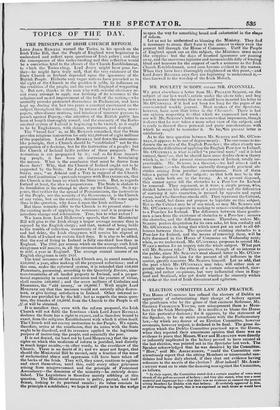MR. POULETT SCROPE versus MR. O'CONNELL.
WE print elsewhere a letter from Mr. Poueerr SCROPE, on the subject of our last week's article under the above title; and beg leave to assure the writer that we should have inserted his letter to Mr. O'CONNELL if it had not been too long for the pages of an over-crowded weekly journal. Most readers of the Spectator. however, have seen that letter in the Chronicle. There is but one opinion respecting it—that which we expressed last week : nor will Mr. SCROPE'S letter to us remove that impression, though it shows that he now takes a more sober view of the subject, and is ready to discard those personal and party considerations with which he sought to ice:umber it. So far,l'his present letter is satisfactory.
As to the true question between Mr. Scam: and Mr. O'Corr- NEL L, it appears to be one of degree merely. The one seems to un- derrate the merits of the English Poor-law ; the other clearly un- derrates the difficulties of applying the English Poor-law to Ireland. Mr. O'CONNELL is what is called "a practical man:" and it is but natural, therefire, that he should have souse doubts about a theory which is, meltr the present circumstances of Ireland, totally im- practicable. Mr. SCRAPE is a theorist,—we had almost said a mere theorise—who therefore naturally disregards practical ob- stacles arising from peculiar circumstances. Each of them takes a partial view of the subject; so that both may be in the right, while both are in the wrong. As at present disposed, they cannot agree till the obstacles to a Poor-law for Ireland be removed. They represent, as it were, a single person, who, divided between his admiration of a principle and the difficulties of carrying it into execution, is pressed by opposite and equal forces, and who therefore stands still. They represent the Cabinet, which would, but dares not propose to legislate on this subject. But as the Cabinet may be of one mind, so may Mr. Sceore and Mr. O'CONNELL cooperate in seeking to remove existing obstacles to a Poor-law for Ireland. The difference between those gentle- men arises from the existence of obstacles to a Poor-law : remove the obstacles, and the difference ceases. Therefore, unless Mr. SCROPE prefers disputation for its own sake, let him cordially aid Mr. O'CONNELL in doing that which must put an end to all dif- ference between them. The question of existing obstacles to a , Poor-law for Ireland, and the means of removing them, will be fully discussed in the House of Commons on Wednesday next; when, as we understand, Mr. O't2ONNELL proposes to second Mr. WARD'S motion for an inquiry into the whole subject. What part will Mr. SCROPE take? This question, though of no interest to the public, since Mr. Scaoee's most absurd letter to Mr. O'CON- NELL has deprived him for the present of all influence in the matter, greatly concerns Mr. SCROPE himself. Let us add, that the part which Mr. O'CONNELL may take, will either sink or greatly raise him in the esteem of a certain sober-minded, slow- going, and rather suspicious, but very influential class in Eng- land and Scotland, who yet doubt whether he sincerely wishes to strike at the root of Irish discontent and agitation.


























 Previous page
Previous page